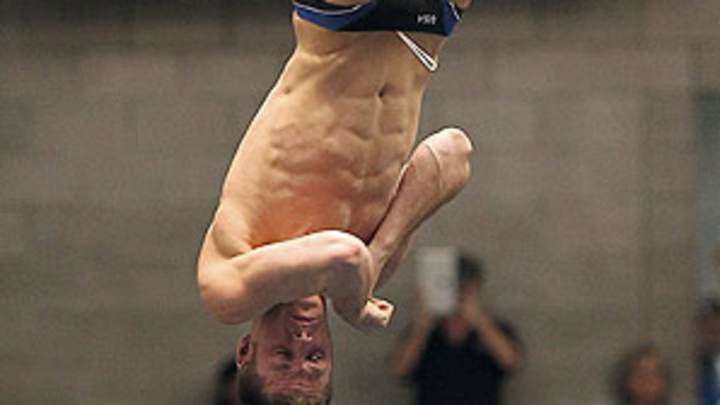Boudia shows he can contend for a medal; more diving trials lessons


Three observations from USA Diving's Olympic trials to take into the London Olympics ...
1. The U.S. can medal in London, but it's not assured.
There were very few surprises among the seven events at the diving trials that determined the 11-person Olympic team. Those expected to qualify for the team did, and most did fairly easily.
But only David Boudia, a 23-year-old recently engaged Purdue student, is expcted to medal in London. The 2011 world silver medalist on the platform ran away with from the competition by outdistancing his nearest competitor by 60 points with a 15-dive total of 1,642.4 points (almost identical to his margin of victory in 2008, when he scored 1,642.2 points). But these trials were different because USA Diving brought in a group of international judges to dampen the score inflation that can often accompany national meets. Boudia will have his hands full in London with two Chinese divers (including favorite Qiu Bo), defending Olympic champion Australian Matthew Mitcham and the host country's best diver, 2009 world champion Tom Daley.
"We're not really focused on results," Boudia told NBC. (USA Diving's new philosophy is to stress performance, not medals.) "But I know there's still more in the tank."
The other qualifiers who have a chance in London: Boudia and Nick McCrory in synchro platform (fifth at 2011 worlds), Chris Colwill (first at the 2012 USA Diving Grand Prix) and Troy Dumais (fifth at 2011 worlds) in springboard, Dumais and Kristian Ipsen in synchro springboard (fourth at 2011 worlds), and Christina Loukas (fourth at 2011 worlds) in women's springboard.
2. Give it up for Troy Dumais.
The 32-year-old Dumais became the second U.S. male diver to make four Olympic teams, joining the famed Greg Louganis. He'll compete in both the synchro and individual springboard competitions, the latter berth coming in the most thrilling individual finish of the trials.
The top two finishers in each event make the Olympic team, and the men's springboard featured three elite candidates -- Ipsen (993 points going into Sunday's final), Dumais (954 points) and Colwill (951 points). Given Ipsen's lead, the battle appeared to be between Dumais and Colwill for the second and final Olympic spot.
But Ipsen's advantage vanished in the fifth of six rounds, when he came up short on a reverse 3 ½-somersault dive that scored 4.5s from judges and 47.25 total points (his average score had been about 80 points in the first four rounds). The rising Stanford sophomore fell from a safe first into third. Two points separated the trio going into a suddenly pressure-filled final round.
Colwill went first and nailed a reverse 3 ½ for 99.75 points, the best of any diver in the finals. Then came Dumais, who fortuitously switched his order to perform a more confident dive in the final round. Dumais hit it for 91.80 points, scoring 9s and 9.5s like Colwill but with a lower degree of difficulty.
Then came the 19-year-old Ipsen. His reverse 1 ½ with 3 ½ twists were equally impressive. Immediately after he splashed, Ipsen scurried out of the pool and rested his hands on his head, water still streaming down his face, and waited for the final score.
"I thought I had made it," Ipsen told the Associated Press.
He hadn't. The score came up -- 91.80, matching his synchro partner -- but he fell 1.25 points shy of second place. Ipsen bent over, put his hands on his knees and wiped at his forehead, not too dismayed given he was already an Olympian in synchro.
"I'm trying to think of it as a blessing, because going into international meets, I get really nervous," Ipsen told USA Diving. "Only doing synchro gives me just one thing to focus on. I'll use this as a learning experience."
As for Dumais, once he steps on the diving board in London, he'll be the first man to compete in four Olympics (since Louganis was kept from competing in the 1980 Games due to the boycott). Juno Irwin, a two-time platform medalist, is the only U.S. woman to compete in four Olympics.
3. Welcome to the Olympics, Brittany Viola. Farewell, Thomas Finchum.
It took three tries, but Viola is finally an Olympian. She was defeated by Laura Wilkinson in the 2004 trials and was an Olympic alternate again in 2008. It's a huge relief for the daughter of Cy Young-winning pitcher Frank Viola.
Her famous father may be feeling even more relief. Before the final, the pitching coach for the Savannah Sand Gnats of the South Atlantic League told the Savannah Morning News, "I'm more nervous over this [than pitching in a World Series]. With this I have no control."
He couldn't be in Federal Way, Wash., to see his daughter cruise to the platform title Sunday. He was at the ballpark, watching his Sand Gnats lose 2-1 to the Augusta GreenJackets.
On the men's side, the most poignant moment of the week came near the end of the men's platform competition. Finchum, a 2008 Olympian, completed his list of dives and finished in third place, ending his chance to return to the Games.
Finchum took a few steps out of the pool and, before he could dry off, welled eyes included, he was met with an embrace from his coach, John Wingfield. Not much was audible from the telecast, except for this:
"You'll always be a 2008 Olympian," Wingfield said.
Later that night, Finchum, 22, announced via Twitter he would retire from the sport. Finchum placed 12th individually at the 2008 Olympics and fifth in synchro with Boudia. He's the lead singer of the country group Northern Nights and plans to move from Indiana to Nashville, attend Belmont University and immerse in a music career.
